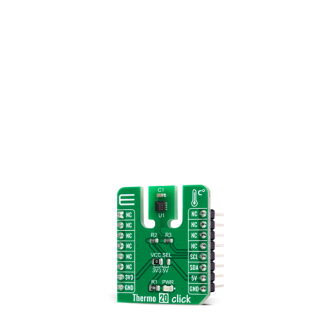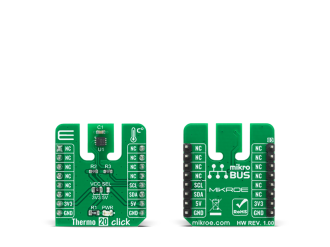
We strongly encourage users to use Package manager for sharing their code on Libstock website, because it boosts your efficiency and leaves the end user with no room for error. [more info]

Rating:
Author: MIKROE
Last Updated: 2020-11-11
Package Version: 1.0.0.0
mikroSDK Library: 1.0.0.0
Category: Temperature & humidity
Downloaded: 2844 times
Not followed.
License: MIT license
Thermo 20 Click is a compact add-on board that provides an accurate temperature measurement. This board features the TSYS03, a miniature digital temperature sensor that comes up with factory calibrated, highly accurate temperature data from TE Connectivity Measurement Specialties.
Do you want to subscribe in order to receive notifications regarding "Thermo 20 click" changes.
Do you want to unsubscribe in order to stop receiving notifications regarding "Thermo 20 click" changes.
Do you want to report abuse regarding "Thermo 20 click".


Library Description
The library covers all the necessary functions to control Thermo 20 board™ board. Library performs a standard I2C interface communication.
Key functions:
float thermo20_get_temperature ( void ) - Get temperature data function.void thermo20_soft_reset ( void ) - Soft reset function.void thermo20_start_conversion ( void ) - Start conversion function.Examples description
The application is composed of three sections :
void application_task ( )
{
thermo20_start_conversion( );
Delay_ms( 100 );
temperature = thermo20_get_temperature( );
FloatToStr( temperature, log_text );
mikrobus_logWrite( " Temperature : ", _LOG_TEXT );
mikrobus_logWrite( log_text, _LOG_TEXT );
mikrobus_logWrite( " C", _LOG_LINE );
mikrobus_logWrite( "-----------------------------", _LOG_LINE );
Delay_ms( 3000 );
}
Other mikroE Libraries used in the example:
Additional notes and informations
Depending on the development board you are using, you may need USB UART click, USB UART 2 click or RS232 click to connect to your PC, for development systems with no UART to USB interface available on the board. The terminal available in all MikroElektronika compilers, or any other terminal application of your choice, can be used to read the message.